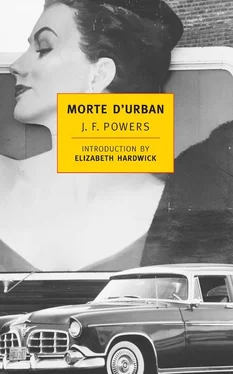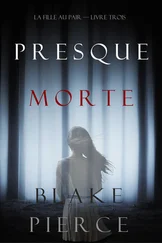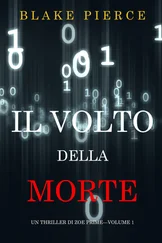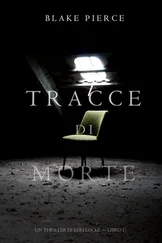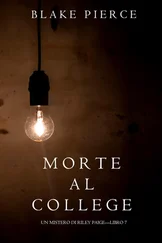“Dark green,” said the Bishop.
“You don’t know how glad I am to hear you say that,” said Father Urban, glad that the Bishop agreed with him, glad also that Father Feld had been cut down. “The farmers around here seem to have a fixation on the color white. Sometimes when I look at this old place now, I think I can see dirty white chickens moving around in the yard. Hard to believe they’re not there.”
Father Feld, who had a square head, wore a puzzled look, and the Bishop was not appreciative. Great Plains, after all, was a rural diocese, and so the Bishop made a point of being for everything rural — hence the public prayers all summer long for whatever it was he was told that the farmers wanted in the way of weather.
“And I’d like to move the front porch away from that dusty road, around to this side,” Father Urban went on, “so our guests could enjoy a view of the fairways.”
“Could you see the lake then?” the Bishop asked.
“You’d catch a glimpse of it, Your Excellency, through the trees.”
The Bishop nodded.
“And, of course, we’ll have to put in toilet facilities downstairs,” Father Urban said.
“Oh, I don’t know,” said the Bishop.
“No?”
“Worried about mixed company, aren’t you, Father?”
“There’s more to it than that.” Father Urban was suddenly at a loss to define his position. To him there was something oddly disquieting about people — strangers — traipsing upstairs to the bathroom in the clubhouse. “I guess I was just thinking it would be a great improvement. That’s all. Of course, there’s no harm in the way it is now.”
“Oh, I understand that, Father, but I was just wondering if maybe you aren’t making things too easy here for everybody .”
“There’ll be some changes here next year, Your Excellency,” said Father Urban. Himself he had already given up playing for money, even though what he’d won (always from laymen well able to lose), every dollar of it, had gone toward the upkeep of the course.
“Everybody except yourself, that is,” said the Bishop.
Father Urban hadn’t realized that the Bishop could throw such a punch. It may have been a little low, too. The Bishop had made it sound as though Father Urban were advocating lay investiture. In the ensuing void, Father Urban endeavored to calm himself. Now he knew what he was up against — puritanism and black clericalism.
He hadn’t wanted to see the Bishop anywhere near the course again — not after the last time. But the Bishop had wanted to come, calling the night before to say that he’d be driving over with a young friend, and that he might want to snoop around a bit, too, after playing nine. Father Urban, alarmed, had phoned the Cathedral. “It figures,” Monsignor Renton had said. “His young friend will be Herman Feld, I imagine. They’ve been playing together over here.” According to Monsignor Renton, Father Feld would be just the man to head a seminary. “He’s been over in Europe for three or four years. Louvain. He’s fit for nothing else, now.”
If there was to be an ultimatum that day, Father Urban prayed that it would not be delivered on the golf course, for peaceful persuasion would be all but impossible there, in the heat of play. Probably the Bishop would want Wilf, as rector, to be present for anything like that, and Wilf would be in his office, where he liked to be discovered hard at work. Somewhere along the line, though, as they were beating their way around the course, Father Urban expected to be able to tell whether the ultimatum was to come.
On the first tee, waiting with the clubs, were three novices who had been instructed in the niceties of caddying for a prelate. For one thing, the Bishop would shoot first off the tee unless he insisted that low man go first — as he certainly hadn’t the last time. The other players would follow always in the same order, and thus the Bishop would be shown respect in which there would be no connotation of ineptitude on his part, or undue hoggishness. It was the Bishop’s ball, therefore, that was already teed up.
Father Urban was surprised to see that the Bishop, taking a few practice cuts, was no longer trying to kill the ball. Evidently Father Feld had been working on the Bishop’s swing, tailoring it to his manifest deficiencies as an athlete. The Bishop had invested in new clubs, but he obviously hadn’t made up his mind about dressing for the game. He was wearing black oxfords to which crepe soles had been applied, black summer-weight serge trousers, a white dress shirt with its sleeves rolled up almost to his elbows and with its collar folded down under — you didn’t see that much any more — and an old straw katy.
“Nice one,” said Father Urban. The Bishop’s drive had gone up like a balloon and had come down not more than a hundred and thirty yards out, but it had gone right down the middle — practically an episcopal pronouncement.
Father Feld went next. He was wearing army-surplus clothing and golf shoes, and he was black from the sun, like Father Urban. His body was short and bullish, and he was younger than Father Urban by twenty years. Oh, twenty-five. His clubs had been used a lot, and they were good ones. He took no practice swing, so there was no telling about him until he laid into the ball. His drive stopped rolling about two hundred and fifty yards out.
“Good enough,” said Father Urban. He teed up his ball, thinking that he’d somehow have to outplay Father Feld. He removed his stained and floppy panama and waved away some gnats that had suddenly appeared over his ball. He cautioned himself not to try to outdrive the Bishop’s young friend. Then he threw his body — medium tall and willowy except for a slight pot — into his foreswing and hit a good long ball that dropped about where he’d hoped it would and kicked, accordingly, to the left. He was short of Father Feld, but in a better position to see the green.
Neither the Bishop nor Father Feld commented on the shot.
The threesome moved off down the fairway, followed by their caddies, nobody talking, until Father Urban said, “Get any golf over there?”
“Some,” said Father Feld.
Coming to the Bishop’s ball, and seeing that the lie was only fair, Father Urban said, “Winter rules, if you like, Your Excellency. I’m not happy about these fairways yet.”
The Bishop shrugged off the suggestion, and, presumably, although he had two hundred yards ahead of him, didn’t want to use a wood, anyway. Father Feld was handing the Bishop not a two but a five iron. The Bishop hit the ball cleanly for a distance of about ninety yards and appeared to be well satisfied.
Father Feld went over the green on his second shot, though not into a trap. Father Urban put his second one on the green — only just, but he wanted to putt uphill. The Bishop hit another five iron and was still short. Using the same club, he was finally on. The Feld system seemed to call for the Bishop to use only a spoon, mashie, and putter. Father Urban would have been reluctant to suggest such measures to such a man, but he had to admit that the Bishop’s game had improved through simplification, unless he was playing over his head.
Father Feld ran his third shot past the cup. The Bishop moaned. Father Urban and the Bishop both missed long putts. Then Father Feld, who had left himself a twenty-footer, got lucky. “That’s more like it, Herman,” said the Bishop.
After he’d holed out, the Bishop said, “In the circumstances, I think I’d better be scorekeeper.” He was given custody of the pencil and card. “Father Urban?” he asked, after jotting down his own score.
“Four, Your Excellency.”
“And four for Herman. Well!”
It was now clear to Father Urban that this was not to be just another round of golf, that the Bishop wished to see done what he could not do himself, and that he had chosen young Father Feld to be the weapon of his will, his champion. Father Urban’s defeat was not a necessary part of the Bishop’s larger plan of conquest, but Father Urban could understand its appeal — to create an omen, as it were, and then to act in accord with it. In Father Urban’s mind, informed as it was by a good deal of solid reading, the match between him and Father Feld took on the appearance of a judicial duel. Victory for Father Urban in the field, however, would not mean victory for his cause. That was the hell of it. Father Urban had read of many ordeals by combat (in the dim past even religious men, unfortunately, had sometimes appealed to the God of Battles for justice), but he doubted that history would reveal a parallel case. He pushed on, with his driver drawn, to the second tee.
Читать дальше
